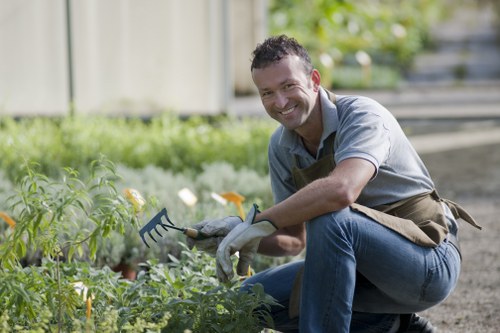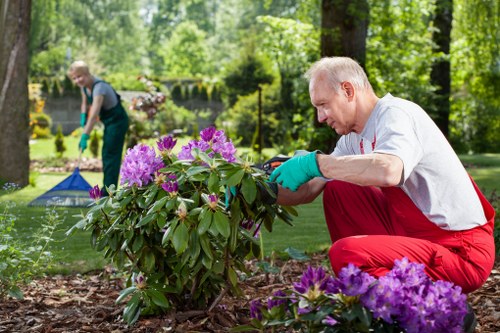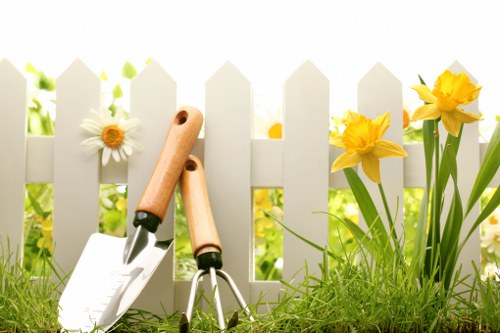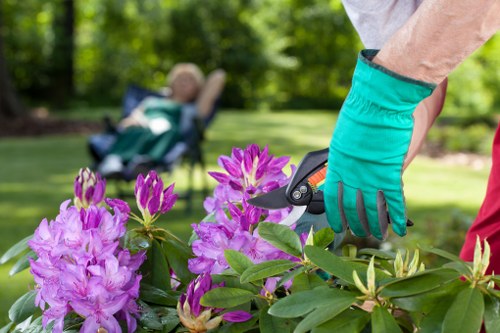Effective Garden Maintenance Services in Harlesden

Maintaining a beautiful garden requires dedication, knowledge, and the right resources. In Harlesden, where green spaces are cherished, garden maintenance plays a crucial role in enhancing the aesthetic appeal and overall health of your outdoor environment.
Whether you're a seasoned gardener or a homeowner looking to spruce up your garden, understanding the essentials of garden maintenance in Harlesden can help you achieve a vibrant and thriving landscape.
From seasonal planting to regular upkeep, this comprehensive guide covers everything you need to know to keep your garden in top shape all year round.
Understanding Garden Maintenance

Garden maintenance encompasses a variety of tasks aimed at preserving the beauty and functionality of your garden. This includes pruning, weeding, watering, fertilizing, pest control, and more.
In Harlesden, local climate conditions and soil types influence the specific maintenance practices you'll need to implement. Tailoring your approach to fit these factors ensures your garden remains healthy and resilient.
Regular maintenance not only enhances the visual appeal of your garden but also supports the growth of plants, fosters biodiversity, and contributes to a sustainable environment.
Key Components of Garden Maintenance

Pruning and Trimming: Removing dead or overgrown branches promotes healthy growth and maintains the desired shape of plants and shrubs.
Weeding: Eliminating unwanted plants prevents competition for nutrients and reduces the risk of pests and diseases.
Watering: Providing adequate water is essential, especially during dry spells, to keep plants thriving.
Seasonal Garden Care in Harlesden

Each season brings its own set of challenges and opportunities for garden maintenance. Understanding what to focus on during each time of the year can make a significant difference in your garden's health.
Spring: This is the perfect time for planting new flowers, fertilizing the soil, and preparing your garden for the growing season.
Summer: Regular watering, pest control, and deadheading flowers help keep your garden vibrant and free from unwanted visitors.
Spring Maintenance Tips

Spring is a time of renewal, making it ideal for revitalizing your garden. Begin by clearing away any debris from winter and pruning back any damaged plants.
Planting early-blooming flowers and vegetables ensures they have the full growing season to develop.
Applying a balanced fertilizer in spring provides essential nutrients that support healthy plant growth throughout the year.
Summer Maintenance Tips
Summer's warmer temperatures require consistent watering to prevent plants from wilting.
Implementing mulching helps retain soil moisture and reduces weed growth.
Regularly inspect plants for signs of pests and diseases, addressing any issues promptly to maintain a healthy garden.
Choosing the Right Plants for Harlesden Gardens
Selecting plants that are well-suited to Harlesden's climate and soil conditions is vital for a low-maintenance and flourishing garden. Opt for native species and those known for their resilience and minimal care requirements.
Consider factors such as sunlight exposure, water needs, and growth patterns when choosing your plants. This ensures they thrive with the least amount of intervention, allowing you to enjoy a beautiful garden without excessive effort.
Popular Plants in Harlesden
- Lavender – thrives in sunny areas and requires minimal watering.
- Hostas – ideal for shaded spots and known for their attractive foliage.
- Roses – a classic choice that, with proper care, adds elegance to any garden.
- Geraniums – vibrant flowers that are easy to maintain and bloom profusely.
- Boxwood – versatile shrubs perfect for creating structured garden designs.
Soil Health and Fertilization
Healthy soil is the foundation of a thriving garden. Regularly testing your soil's pH and nutrient levels can provide insights into what amendments are needed to support your plants.
Incorporating organic matter, such as compost or manure, enhances soil structure, improves drainage, and increases fertility.
Organic vs. Synthetic Fertilizers
- Organic Fertilizers: Derived from natural sources, they release nutrients slowly, improving soil health over time.
- Synthetic Fertilizers: Provide immediate nutrient boosts but can lead to soil degradation if overused.
For a sustainable garden, organic fertilizers are often recommended as they support long-term soil vitality and reduce the risk of harmful runoff.
Pest and Disease Management
Maintaining a pest-free garden is essential for plant health. In Harlesden, gardeners may encounter a variety of pests, from common aphids to more challenging invaders like slugs and snails.
Implementing integrated pest management (IPM) strategies can help control pest populations while minimizing environmental impact.
Natural Pest Control Methods
- Beneficial Insects: Introducing ladybugs and predatory beetles can naturally reduce aphid and mite populations.
- Neem Oil: A natural pesticide that effectively controls a wide range of garden pests.
- Handpicking: Regularly inspecting plants and removing pests manually is a simple yet effective method.
Irrigation Systems for Efficient Watering
Efficient watering practices are crucial, especially during Harlesden's warmer months. Installing an irrigation system can ensure your garden receives consistent moisture without the hassle of manual watering.
Drip irrigation and soaker hoses are popular choices as they deliver water directly to the plant roots, reducing evaporation and water waste.
Benefits of Automated Irrigation
Automated systems allow for precise watering schedules, ensuring plants receive the right amount of water at optimal times.
This not only conserves water but also promotes healthier plant growth and reduces the risk of over or under-watering.
Mulching for Garden Health
Mulching is a simple yet effective garden maintenance practice that offers numerous benefits. It helps retain soil moisture, suppresses weed growth, and regulates soil temperature.
Organic mulches, such as bark, straw, or compost, also contribute to soil fertility as they decompose over time.
Types of Mulch
- Organic Mulch: Enhances soil health and adds aesthetic value.
- Inorganic Mulch: Provides long-lasting weed suppression and moisture retention.
- Recycled Mulch: Eco-friendly options made from recycled materials.
Pruning and Trimming Techniques
Regular pruning and trimming are essential for maintaining plant health and encouraging vigorous growth. Proper techniques ensure that plants remain well-shaped and free from diseased or damaged branches.
Different plants require specific pruning methods, so it's important to understand the needs of each species in your garden.
Pruning Tools and Maintenance
Using the right tools, such as sharp pruning shears, loppers, and saws, makes the task easier and more effective.
Regularly maintaining your tools by cleaning and sharpening them prolongs their lifespan and ensures precise cuts.
Composting for Sustainable Gardening
Composting transforms kitchen scraps and garden waste into nutrient-rich compost that enhances soil fertility.
Implementing a composting system in your garden reduces waste and provides a sustainable source of organic matter for your plants.
Starting a Compost Pile
- Choose a Location: Select a dry, shady spot near a water source.
- Layering: Alternate layers of green (nitrogen-rich) and brown (carbon-rich) materials.
- Maintenance: Turn the pile regularly to aerate and speed up decomposition.
Garden Design and Layout
A well-planned garden design enhances the functionality and beauty of your outdoor space. Consider factors such as plant height, color schemes, and spatial arrangements when designing your garden layout.
Incorporating elements like pathways, seating areas, and focal points can add structure and interest to your garden.
Creating a Balanced Garden
- Symmetry: Balanced arrangements create a harmonious look.
- Variety: Mixing different plant types and textures adds depth and visual interest.
- Focal Points: Feature plants or garden structures that draw the eye.
Year-Round Garden Maintenance Checklist
Maintaining your garden throughout the year ensures sustained health and beauty. Here's a monthly checklist to keep you on track:
- January: Plan your garden layout and order seeds.
- February: Prepare soil by adding compost and fertilizer.
- March: Start planting early vegetables and flowers.
- April: Mulch beds and stake young plants.
- May: Regular watering and pest inspections.
- June: Prune summer-flowering shrubs.
- July: Harvest vegetables and deadhead flowers.
- August: Maintain irrigation systems and monitor for diseases.
- September: Plant autumn blooms and begin fall clean-up.
- October: Rake leaves and protect perennials.
- November: Prepare garden beds for winter.
- December: Review garden performance and plan for next year.
Hiring Professional Garden Maintenance Services
While DIY garden maintenance is feasible, hiring professional services can save time and ensure expert care. Local gardeners in Harlesden are familiar with the area's climate and can provide tailored maintenance solutions.
Professional services offer comprehensive care, from regular mowing and pruning to specialized treatments and seasonal planting.
Benefits of Professional Maintenance
Entrusting your garden to professionals ensures that it receives consistent and knowledgeable care, leading to a healthier and more attractive outdoor space.
Additionally, professionals can offer valuable advice on plant selection, garden design, and sustainable practices tailored to your specific needs.
Sustainable Gardening Practices
Adopting sustainable practices in your garden not only benefits the environment but also enhances the long-term health of your plants. Techniques such as rainwater harvesting, composting, and using native plants contribute to a more eco-friendly garden.
Implementing these practices in Harlesden promotes biodiversity, conserves resources, and creates a resilient garden ecosystem.
Eco-Friendly Gardening Tips
- Rainwater Collection: Use barrels to collect rainwater for irrigation.
- Native Plants: Choose species that are adapted to the local climate and require less maintenance.
- Organic Pest Control: Utilize natural methods to manage pests without harmful chemicals.
Tools and Equipment for Garden Maintenance
Having the right tools is essential for efficient garden maintenance. Essential tools include pruning shears, a spade, a watering can or hose, a wheelbarrow, and gardening gloves.
Investing in quality tools can make tasks easier and more enjoyable, while also ensuring that your garden care is effective and precise.
Essential Gardening Tools
- Pruning Shears: For trimming and shaping plants.
- Spade: Useful for digging and soil preparation.
- Watering Can/Hose: Ensures plants receive adequate moisture.
- Wheelbarrow: Assists in transporting soil, compost, and plants.
- Gardening Gloves: Protect your hands while working.
Common Garden Problems and Solutions
Even with regular maintenance, gardens can encounter various issues such as pest infestations, diseases, and weed overgrowth. Identifying and addressing these problems promptly is key to maintaining a healthy garden.
Implementing preventative measures, such as proper plant spacing and regular inspections, can reduce the likelihood of serious issues.
Pest Infestation Solutions
- Biological Controls: Use natural predators to manage pest populations.
- Mechanical Barriers: Install nets or fences to prevent pests from reaching plants.
- Cultural Practices: Rotate crops and maintain garden hygiene to deter pests.
Enhancing Garden Aesthetics
Aesthetics play a significant role in garden maintenance. Incorporating elements like decorative stones, garden sculptures, and lighting can elevate the visual appeal of your garden.
Choosing a cohesive color palette and plant variety ensures that your garden remains visually pleasing and harmonious.
Decorative Elements
Adding pathways, benches, and water features can create focal points and make your garden a more inviting space.
Thoughtfully placed decorations enhance the overall design and provide opportunities for personal expression in your garden layout.
Conclusion
Effective garden maintenance in Harlesden involves a combination of regular care, informed plant selection, and sustainable practices. By understanding the unique aspects of your local environment and implementing tailored maintenance strategies, you can cultivate a beautiful and thriving garden.
Whether you choose to manage your garden independently or seek professional assistance, prioritizing maintenance ensures that your outdoor space remains a source of enjoyment and pride.
Contact us today to learn more about our garden maintenance services in Harlesden and take the first step towards a stunning garden.